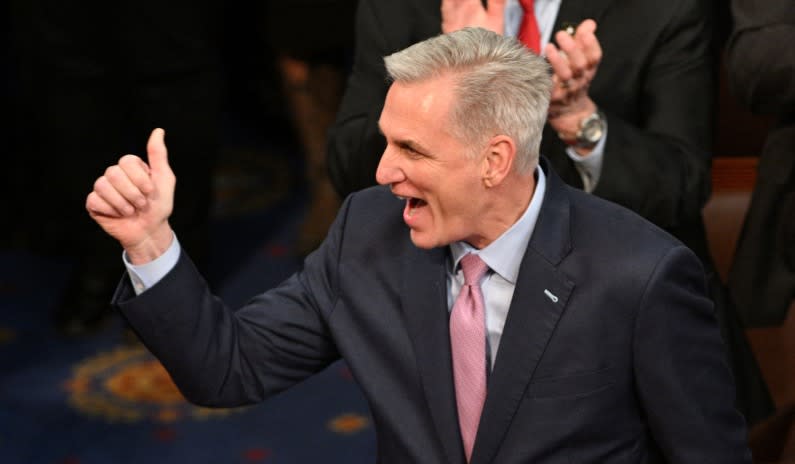Majority of Republicans Approve of McCarthy’s Election to the Speakership: Poll

- Oops!Something went wrong.Please try again later.
A majority of Republicans support Kevin McCarthy’s election to the House speakership, according to a new Economist-YouGov poll.
Despite the chaos surrounding the speakership race, 59 percent of Republicans approve of McCarthy’s election, 21 percent disapprove and 20 percent are not sure, the poll found. The poll, which was conducted from January 7 to 10 among 1,500 U.S. adults, has a margin of error of 3 points.
McCarthy at last clinched the speakership earlier this month after an all-week marathon of ballots and negotiations and a heated final stretch on the House floor.
Representatives Andy Biggs and Eli Crane of Arizona, Bob Good of Virginia, and Matt Rosendale of Montana all voted “present” in the 15th round of voting, helping to lower the threshold of votes needed to win. Representatives Matt Gaetz of Florida and Lauren Boebert of Colorado voted “present” in both the 14th and 15th rounds as well. McCarthy narrowly won with 216 votes, having needed 215. Democrat Hakeem Jeffries (D., N.Y.) earned 212.
Forty-six percent of Republicans said they are not sure if they approve of how McCarthy is handling his job. Forty-two percent said they strongly or somewhat approve and 12 percent said they strongly or somewhat disapprove, according to the poll.
Forty-four percent of Republicans believe McCarthy will be an effective Speaker. Just 19 percent of Democrats and 15 percent of independents said the same.
Some House Republicans have expressed concern about the concessions McCarthy made to a group of 20 GOP holdouts in order to secure their support in the speakership voting. House Freedom Caucus members are reportedly set to receive three of the nine seats on the House Rules Committee as part of the compromises.
The House passed its new rules package last week, which includes just several of a slate of concessions that McCarthy made in an effort to win support for his speakership bid from the Republican holdouts. Many of those compromises were made orally, rather than having been explicitly written into the rules package.
“I like the rules package,” Representative Nancy Mace (R., S.C.) said ahead of the vote. “It is the most open, fair, and fiscally conservative package we’ve had in 30 years. I support it, but what I don’t support is a small number of people trying to get a deal done or deals done for themselves in private, in secret, to get a vote or vote present.”
Republican respondents in the YouGov poll were split evenly — 34 percent to 34 percent — on whether the GOP holdouts were voting against McCarthy to win more power for themselves or because they had serious concerns about the California Republican. Twenty-nine percent of independents said it was to leverage more power for themselves, while 26 percent said it was because of serious concerns. A majority of Democrats —53 percent — said the holdouts were looking for power, while just 18 percent said they had serious concerns.
Among the concessions made in the package is a requirement to provide 72 hours of notice before a vote on new legislation, to allow members to have more time to review bills before they reach the floor. The rules package also restores the motion to vacate, which allows just one member of the House to call a vote to remove McCarthy from his role as speaker.
The package also reinstates the Holman rule, allowing lawmakers to amend appropriations legislation to reduce lawmakers’ salaries, fire federal employees, and cut programs.
The rules package details the formation of a House oversight subcommittee for investigating the origins of the Covid-19 pandemic and the U.S. government’s involvement in gain-of-function research.
In his negotiations with the Republican defectors, McCarthy also committed to removing metal detectors from the House chambers and ending proxy voting.
McCarthy also agreed to vote individually on twelve appropriation bills instead of on one massive omnibus spending bill and to hold a vote on legislation on term limits for members of Congress.

